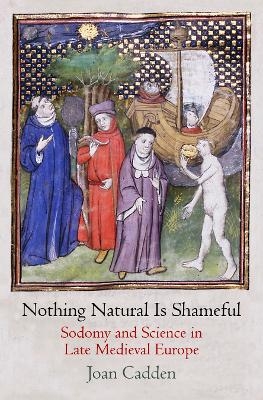
Nothing Natural Is Shameful
Sodomy and Science in Late Medieval Europe
Seiten
2013
University of Pennsylvania Press (Verlag)
978-0-8122-4537-0 (ISBN)
University of Pennsylvania Press (Verlag)
978-0-8122-4537-0 (ISBN)
- Lieferbar (Termin unbekannt)
- Versandkostenfrei innerhalb Deutschlands
- Auch auf Rechnung
- Verfügbarkeit in der Filiale vor Ort prüfen
- Artikel merken
In medieval Europe, where theologians saw sin, some natural philosophers saw a phenomenon in need of explanation. They believed some men were born with homosexual inclinations and others acquired them as habits based on early pleasurable experiences.
In his Problemata, Aristotle provided medieval thinkers with the occasion to inquire into the natural causes of the sexual desires of men to act upon or be acted upon by other men, thus bringing human sexuality into the purview of natural philosophers, whose aim it was to explain the causes of objects and events in nature. With this philosophical justification, some late medieval intellectuals asked whether such dispositions might arise from anatomy or from the psychological processes of habit formation. As the fourteenth-century philosopher Walter Burley observed, "Nothing natural is shameful." The authors, scribes, and readers willing to "contemplate base things" never argued that they were not vile, but most did share the conviction that they could be explained.
From the evidence that has survived in manuscripts of and related to the Problemata, two narratives emerge: a chronicle of the earnest attempts of medieval medical theorists and natural philosophers to understand the cause of homosexual desires and pleasures in terms of natural processes, and an ongoing debate as to whether the sciences were equipped or permitted to deal with such subjects at all. Mining hundreds of texts and deciphering commentaries, indices, abbreviations, and marginalia, Joan Cadden shows how European scholars deployed a standard set of philosophical tools and a variety of rhetorical strategies to produce scientific approaches to sodomy.
In his Problemata, Aristotle provided medieval thinkers with the occasion to inquire into the natural causes of the sexual desires of men to act upon or be acted upon by other men, thus bringing human sexuality into the purview of natural philosophers, whose aim it was to explain the causes of objects and events in nature. With this philosophical justification, some late medieval intellectuals asked whether such dispositions might arise from anatomy or from the psychological processes of habit formation. As the fourteenth-century philosopher Walter Burley observed, "Nothing natural is shameful." The authors, scribes, and readers willing to "contemplate base things" never argued that they were not vile, but most did share the conviction that they could be explained.
From the evidence that has survived in manuscripts of and related to the Problemata, two narratives emerge: a chronicle of the earnest attempts of medieval medical theorists and natural philosophers to understand the cause of homosexual desires and pleasures in terms of natural processes, and an ongoing debate as to whether the sciences were equipped or permitted to deal with such subjects at all. Mining hundreds of texts and deciphering commentaries, indices, abbreviations, and marginalia, Joan Cadden shows how European scholars deployed a standard set of philosophical tools and a variety of rhetorical strategies to produce scientific approaches to sodomy.
Joan Cadden is Professor Emerita of History at University of California, Davis, and author of Meanings of Sex Difference in the Middle Ages: Medicine, Science, and Culture.
Introduction: The Natural Philosophy of Sodomites and Their Kind
Chapter 1. Moved by Nature
Chapter 2. Habit Is a Kind of Nature
Chapter 3. "Just Like a Woman": Passivity, Defect, and Insatiability
Chapter 4. "Beyond the Boundaries of Vice": Moral Science and Natural Philosophy
Chapter 5. What's Wrong? Silence, Speech, and the Problema of Sodomy
Epilogue
Appendix. Pietro d'Abano, Expositio Problematum Aristotelis, IV.26: A Text
List of Abbreviations
Notes
Manuscripts Consulted
Works Cited
Index
Acknowledgments
| Erscheint lt. Verlag | 31.10.2013 |
|---|---|
| Reihe/Serie | The Middle Ages Series |
| Zusatzinfo | 8 illus. |
| Verlagsort | Pennsylvania |
| Sprache | englisch |
| Maße | 152 x 229 mm |
| Themenwelt | Geschichte ► Allgemeine Geschichte ► Mittelalter |
| Geisteswissenschaften ► Geschichte ► Regional- / Ländergeschichte | |
| Geschichte ► Teilgebiete der Geschichte ► Kulturgeschichte | |
| Geisteswissenschaften ► Psychologie ► Sexualität / Partnerschaft | |
| Sozialwissenschaften ► Soziologie | |
| ISBN-10 | 0-8122-4537-7 / 0812245377 |
| ISBN-13 | 978-0-8122-4537-0 / 9780812245370 |
| Zustand | Neuware |
| Haben Sie eine Frage zum Produkt? |
Mehr entdecken
aus dem Bereich
aus dem Bereich
eine neue Geschichte des Mittelalters
Buch | Hardcover (2023)
C.H.Beck (Verlag)
38,00 €
unterwegs mit Pilgern, Rittern, Abenteurern
Buch | Hardcover (2024)
S. Fischer (Verlag)
28,00 €


